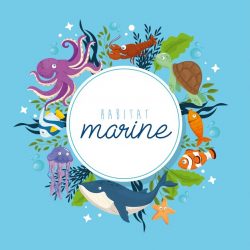Biodiversity is under extreme attack in the high seas. With roughly 70% of the Earth’s surfaces as oceans, protecting biodiversity needed to extend beyond these national jurisdictions. Hence, in June of this year, 2023, nearly 200 countries adopted the Biodiversity Beyond National Jurisdiction treaty, also called the BBNJ. we will explore what this treaty seeks to accomplish and what mechanisms are in place to protect ocean species. And we will examine the most significant risks to this biodiversity. [ dur: 28mins. ]
- Elizabeth Mendenhall is Associate Professor in the Departments of Marine Affairs at the University of Rhode Island. She is the author of Building a Regime Complex for Marine Plastic Pollution and Nuclear Weapons Free Zones and the issue of maritime transit in Latin America.
- Rachel Tiller is a Chief Scientist at SINTEF Ocean in the Department of Fisheries and New Biomarine resources in Norway. She is also the Director of the key strategic research area of biodiversity and area use at SINTEF. She is the author of Orchestration within plastics governance – From global to Arctic and And so it begins – The adoption of the ‘Biodiversity Beyond National Jurisdiction’ treaty.
Invasive species are wreaking havoc all over the world and costing hundreds of billions of dollars per year. The alarming rate of the spread of invasive species are threatening nature, food security, our economies, and human health. Some areas are more successful than others in maintaining or restoring ecosystems with their indigenous species. How bad is the damage from invasive species and what can be done about it? We explore the south pacific island of New Zealand. [ dur: 28mins. ]
- Jacqueline Beggs is Professor at Waipapa Taumata Rau, the University of Auckland’s School of Biological Sciences at the University of Auckland in New Zealand. She is co-Executive Director of Ngā Ara Whetū (www.ngaarawhetu.org), UoA’s flagship research centre on Climate, Biodiversity and Society, and Director of Centre for Biodiversity and Biosecurity. She is the co-author of Science-based, stakeholder-inclusive and participatory conservation planning helps reverse the decline of threatened species.
- Al Glen is is Associate Professor in the Faculty of Science, Biological Sciences at the University of Auckland in New Zealand. He is the co-author of What can wildlife-detection dogs offer for managing small mammalian predators?.
This program is produced by Ankine Aghassian, Doug Becker, Mihika Chechi, Melissa Chiprin, and Sudd Dongre.
Podcast: Play in new window | Download (Duration: 58:00 — 40.0MB) | Embed
Subscribe: Apple Podcasts | Spotify | RSS
